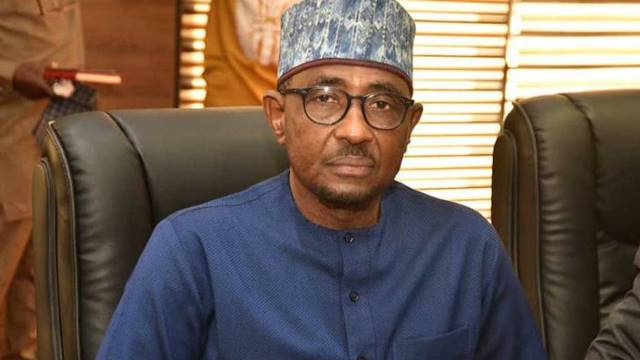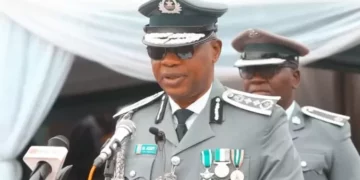The Chief Executive Officer (CEO) of the Nigerian Midstream and Downstream Petroleum Regulatory Authority (NMDPRA), Ahmed Farouk, has dropped the hint that operations of the Africa Energy Bank will commence soon in Nigeria.
Farouk informed industry operators who gathered at the opening of the 18th edition of the Oil Trading and Logistics (OTL) conference in Lagos on Monday, that plans were already being finalised to establish the continental Bank, which shall provide the funds necessary to fast-track the growth of energy supply infrastructure for the continent.
The Africa Energy Bank is a major collaborative success that will assist the continent in its journey towards sustainable and just energy transition.
LEADERSHIP reports that the 18-member African Petroleum Producers’ Organisation (APPO) recently expressed the hope that the lender can begin operating in early 2025, according to the Executive Vice President of global trade at the African Export-Import Bank, Haytham El Maayergi, a partner in the project.
Africa’s oil producers have encountered funding restrictions from traditional western backers, including multilateral institutions whose rules increasingly bar them from oil and gas investment.
The World Bank stopped financing upstream oil and gas projects in 2019 while the African Development Bank (AfDB), which has the US as its number two shareholder, does not put money into fossil fuel projects.
The NMDPRA, he said, would also champion the development and adoption of a uniform gas transportation code within West and North Africa, considering the progression of the West African Gas Pipeline (WAGP) to Morocco, for effective movement of natural gas within the regions.
Furthermore, the NMDPRA will explore mechanisms of facilitating the establishment of an association for Energy Regulators within West Africa which may eventually integrate with the existing East African and South African regional regulators association, into a pan African Energy Regulators association for streamlined regulations and policy formulations.
Speaking on plans to expand Nigeria’s refining sector, Farouk said the industry has been expanding rapidly with the issuance of Nine valid License to Establish (LTEs), Seven License to Construct (LTCs) and Four LTOs for modular refineries. He said the Dangote Petroleum Refinery and Petrochemical (DPRP) came onstream in February 2024, with production of some petroleum products including AGO, ATK etc.
The Refinery commenced production and supply of PMS in September 2024 and that it is expected that supply from the Refinery will improve significantly when it is fully completed and licensed.
The CEO, said the gas sector holds a 16 billion cubic feet of gas daily (BSCF/D) Licensed processing capacity, 5 BSCF/D licensed transportation capacity and 1.5 BSCFD licensed distribution capacity.
Each of the subsector is expanding rapidly alongside the general transformation in the natural gas sector.
He said the NMDPRA would continue to emplace all necessary measures to actualize the full aspirations of the Petroleum Industry Act (PIA).
These include the assurance of quality and safety in the industry, strategic stakeholder engagements, and provision of regulatory support to key government initiatives such as the Decade of Gas and Pi-CNG programs.
Highlighting the significance of the OTL conference which last year focused on “Energy, Synergy and New Beginnings”, prompted Government to review the policy direction of the present administration and the strategic realities of the industry, which include the need for wider collaborations to harness huge potentials of the Africa’s energy resource; addressing the endemic challenge of energy poverty; and the critical need for project financing to bridge the deficit in infrastructure.
This year, the organizers of the conference have adopted the theme ‘Alliances for Growth – Markets, Operations and Policy’ and the keyword ‘synergy’ in the previous theme is similar to the keyword ‘alliances’ in the current theme.
This shows the continuing imperative for effective collaborations between the stakeholders of the industry, added Farouk.
He noted that strategic collaborations and alliances are indeed required for the industry to effectively surmount the emerging and conflicting challenges related to climate action, geopolitical tensions, market stability, and ever-growing energy demand.
Farouk went further to stress that the Midstream and Downstream sector, strong collaborations are required between regulatory Agencies to facilitate ease of doing business, and between businesses to pool resources required for delivering complex projects.
According to him, It is also necessary to expand regional collaborations to enhance cross border trade; and for the industry to establish a robust mechanism for sharing of best industry practices and capacity optimization.
He specifically acknowledged the efforts of the Major Energy Marketers Association of Nigeria (MEMAN) in establishing such a centre in Lagos.
The NMDPRA he assured would work with MEMAN and other stakeholders to explore avenues to extend the services of the center to other midstream and downstream players.
He said the Nigerian petroleum market is indeed undergoing major transformations and the country’s aspired target is to achieve a fully liberalized and matured market for all petroleum products and natural gas, where the market fundamentals lead to robust price discovery and attractive investment opportunities.
The federal Government is also deepening the liberalization of the energy market through robust policies, and provision of generous incentives to encourage investment by both domestic and international companies.
Under the ongoing policy he said the Compressed Natural Gas (CNG) is also being promoted as a veritable alternative to petrol and gas as mobility fuel.
In this regard, several interventions are being implemented to support the expansion of CNG infrastructure through the Pi-CNG, the Decade of Gas Program and the MDGIF.
Progressively, auto- CNG infrastructure is being expanded and eventually, most retail outlets would be required to install CNG add-ons to service the growing number of CNG vehicles nationwide. The NMDPRA is indeed working closely with all stakeholders to accelerate this much needed CNG expansion.
He said the Agency remains resolute and focused on leveraging regulatory framework for creation of extensive value from crude oil and gas resources. “Our organizational and regulatory mandates, as well as performance targets have been clearly set by the PIA and all other key programs of Government (such as the Decade of Gas program, the Pi-CNG, and others) and our mission is therefore to ensure that we provide outstanding enablers that supports all investments in our sector in the next few years.” he said.
He reiterated the commitment to strengthen collaborations on implementing safety measures across the midstream and downstream ecosystem to address the concerns of the public on safety of operations in the sector.
In line with the Government’s directives and efforts on improving affordability and availability of cooking gas, the NMDPRA has been engaging stakeholders on domestication of LPG produced in-country by producers especially Chevron Nigeria Limited (CNL) and Mobil Producing Nigeria (MPN), similar to NLNG which has domesticated 100 per cent of its Butane production since year 2022. In addition, NMDPRA will engage stakeholders in the development of domestic LPG pricing framework in order to make the product readily available and affordable to the consumers.
With regards to alliances, Farouk said the Authority will continue its quarterly domain specific engagements (DSE) with key stakeholders, and on-demand engagements with other relevant parties to address ongoing and emerging concerns.
“We shall also continue with our regional and global engagements related to assurance of energy security, and successful global energy transition.
“The NMDPRA is also working with relevant stakeholders to implement new policies on safety and compliance, especially in the CNG space, which is still in its infancy stage.” he said.





